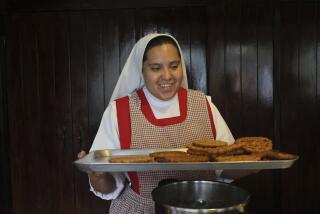Search for Solace, Spiritual Growth : Mother Teresa’s Volunteers Drawn by Need
- Share via
CALCUTTA — The first thing many foreigners discover when they volunteer at Mother Teresa’s missions is that they are just as needy as the impoverished people for whom they care.
They come to this chaotic city from all parts of the world, drawn by the reputation of the Missionaries of Charity, who run the centers for Calcutta’s disadvantaged.
At first, they may say altruism brought them. But soon, they realize that, in their own way, they too are needy and that their search for solace has led them here.
“That’s the only reason Mother Teresa tolerates volunteers,” said Craig Stepanek, 28, an American who spent his university vacation helping at the Nirmal Hriday Home for the Dying Destitutes.
“We don’t really come thousands of miles just to help Indians,” he said. “We’re all here for our own needs, whether ethical, spiritual or moral.”
Washing Clothes and Dishes
The number of foreigners working at the six Calcutta missions ranges from 20 to 80. Most perform menial tasks such as washing clothes and dishes and serving food in addition to caring for the patients.
“The people come, and they really want to give their time to others,” said Sister Priscilla, who oversees the volunteers. “They feel they really profit so much from the spiritual growth.”
The nuns run the program informally. Volunteers may be students taking time off from studies, tourists who decide to stop off in Calcutta or those who come for the explicit purpose of working in the missions.
They pay their own expenses, living in cheap hotels while working half or full days at the centers.
“It is the most uncomplicated thing,” said Uli Treipl, 25, a nurse from Vienna who spent two months in Calcutta. “You may arrive, start work at once and come and go when you want. You are a volunteer, so nothing is fixed and you can learn as long as you want.”
The foreign workers, who usually spend no more than a few months volunteering, emphasized the dual nature of their service, explaining that by performing routine tasks and caring for the sick and destitute they were both giving and receiving.
“I wanted to learn about myself,” said American Matthew Scoble, 19, “and how I would deal with people who, frankly, at my first reaction might repulse me.”
“What’s important is what they can give to people like us who have come to learn,” said Aviva Carlin, 37, an actress raised in Uganda who now lives in England. “It helps you change your perspective about what is important.”
Working at the mission, Carlin said, has helped her overcome the lingering trauma of fleeing Uganda just before Idi Amin came to power, a time fraught with danger and bloodshed.
“I have seen that love is a real power that actually works, that it can do far greater things than the power of people who murder,” she said.
Although the volunteers encounter horrible illnesses and death every day--about half the men brought to Nirmal Hriday never leave the mission alive--they rarely dwell on that aspect.
“Some visitors come to the mission, see the patients on their backs and begin to cry,” said German Tanya Fieber, 19. “But it’s not terrible. For me, Nirmal Hriday is not a home for the dying--it is a home for life.”
Those donating their time prefer instead to discuss the close relationships each has formed with individual patients.
“There are some patients I really cared about,” Scoble said. “And maybe when they died, they knew one more person cared about them. You shouldn’t have to die crawling in the streets.”
Describing their experiences in Calcutta to friends and relatives in the West will be agonizingly difficult, many volunteers said. They said they feared that their feelings might seem trite.
“I am afraid to go back to Belgium and to have to tell people about what I did, because they won’t understand it,” said university student Karin de Pierpont, 22.
All the volunteers agreed that their work in Mother Teresa’s missions profoundly affected their views of poverty, service toward others and the disadvantaged.
More to Read
Sign up for The Wild
We’ll help you find the best places to hike, bike and run, as well as the perfect silent spots for meditation and yoga.
You may occasionally receive promotional content from the Los Angeles Times.






